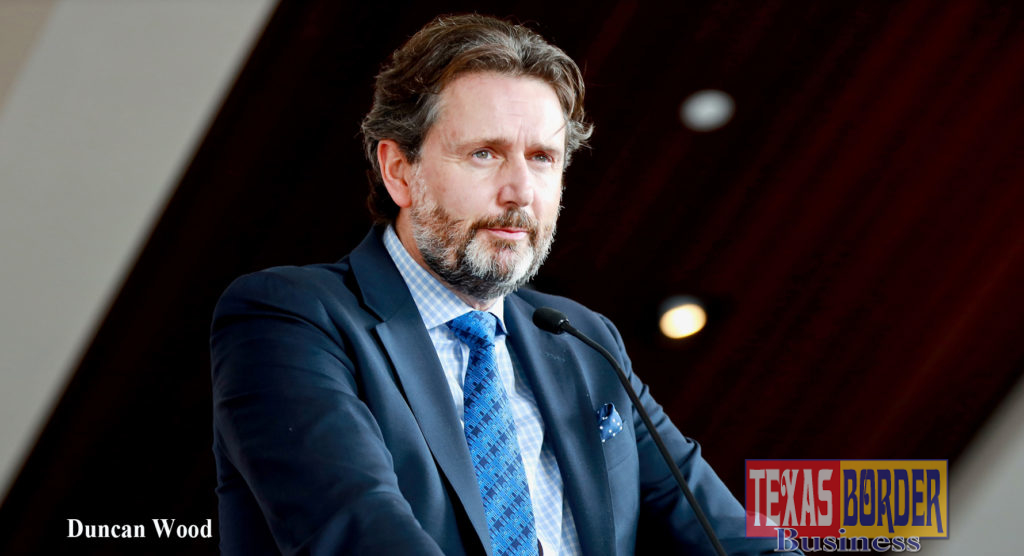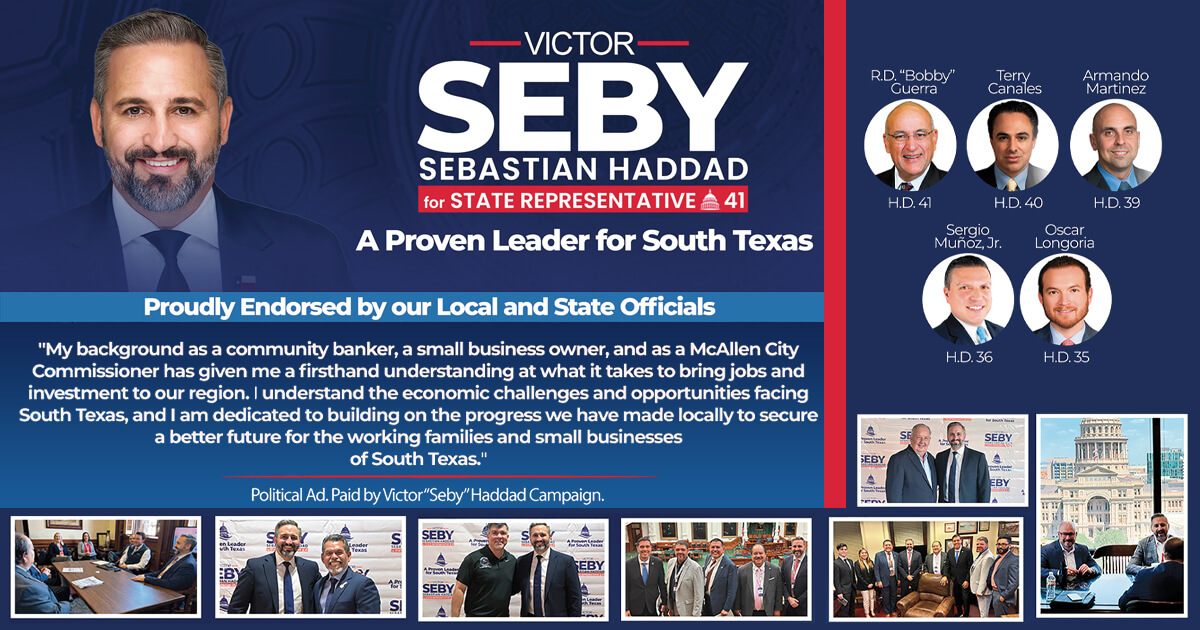López Obrador believes that the public service employees are neoliberals equal to corrupt in his eyes

By Roberto Hugo Gonzalez
As originally published by Texas Border Business newsprint edition February 2020
For the second time, IBC Bank brings Duncan Wood, the Director of Wilson Center’s Mexico Institute. His expertise helps the business community to better understand the economics and globalization of our world. His report also sheds light on matters about Energy, Energy Security, NAFTA/USMCA, Latin America, Mexico, North America, and Canada.
This time around, his topic titled “AMLO and the 4th Transformation of Mexico at One Year” illustrated the business community at a packed McAllen Performing Arts Center.

Adrian Villarreal, President and CEO of the Bank, took over the podium and said, “For those of us who have lived and work along the border, we have always valued our close relationship with Mexico.” He continued, “People from Mexico are our partners in business and trade, and also, our friends, in many cases, part of our families.” He pointed out that whatever happens in Mexico directly impacts South Texas. “Needless to say, Mexico has experienced considerable changes in the last several months, and there are many unknowns. That’s why we brought back again an expert to help us understand what’s going on. As the director of the Mexico Institute at the Wilson Center in D.C., Duncan is a leading voice of all things happening in Mexico.”
Duncan has published on intercontinental issues with the focus on U.S./Mexico relations. He works closely with world economic forums and leverages decades of experience at Mexico’s leading universities, newspapers and editorial boards.
Villarreal noted that when members of Congress need to be briefed on U.S./Mexico relations, they call Duncan. “We’re trying to figure out what the stake is on cross border trade, retail energy, and more.” When Duncan made his presentation last year, he sounded pessimistic about Mexico. This year he admits that he hates to be right. The first year for Andrés Manuel López Obradorhas been complicated.
According to Duncan, Mexico’s election was an extraordinary election for many reasons. It took place in July 2018, when López Obrador rode into power based upon a message of hope, of change, of transforming the country.
“He correctly diagnosed that the Mexican people were sick and tired of the status quo. Even though Mexico had been growing economically and that Mexico was modernizing as a country, more than 50% of the population felt left behind.”
Duncan also pointed out that López Obrador capitalized on that. He was able to propose this dramatic transformation of Mexico, something that he calls the fourth transformation of the country.
He said that López Obrador is using history to transform Mexico, but if you base it on the wrong history, you get the wrong lesson. “Your future is not going to be exactly the best.”
Duncan also pointed out that history recorded that the first transformation of Mexico was Independence. The second was the reform period of the late 19th century under Benito Juárez. The third was the Mexican revolution, and the fourth transformation is today.
“He makes the comparison with the revolution, a time when Mexico was broken and bloodied, divided, split, brother fighting against brother, and household against household.” He continued, “López Obrador said the answer to that was a massive centralization of power, the creation of a hegemonic party which eventually evolved into the PRI, the Revolutionary Institutional Party.”
López Obrador has said, as president, “I need to centralize power, and I need to create a hegemonic party. In this case,Movimiento Regeneración Nacional, (English: National Regeneration Movement) known by its acronym MORENA, the fourth transformation that he talks about, is a transformation of public life.”
He believes that it’s time to end corruption. It’s time to end inequality. It’s time to separate economics from power. Duncan said, “In other words, it shouldn’t just be the wealthy who control things in Mexico, and I think that those are credible laudable goals, but unfortunately how he’s doing it doesn’t seem to be working particularly well.”
Duncan explained that the centralization of power that López Obrador is engaged in now is impressive. “In the election year, he won 53% of the popular vote. A level of support that no other president has seen before. He won not just a majority in the chamber of deputies, but a supermajority, more than two-thirds of the votes through a coalition with some other smaller parties in the Senate. He comes very close to two-thirds of the votes, but a few senators stand on his way.”
Why does that matter? Duncan asked. “Because if you have two-thirds of the votes in the chamber of deputies. Two-thirds of the votes in the Mexican Senate and you have a majority of the state-level legislatures, which is what he has, you can change the constitution at will.” Duncan said, “That’s a very risky situation.”
As he continues, Duncan said, “López Obrador has not stopped at just controlling the government, the party, and the Congress. He has tried to exert his power over the Mexican public service by cutting positions, cutting salaries, cutting benefits. And most people would look at that and say, why would you do that? Why would you want to reduce your execution capacity as the government?”
The answer is that he looks at the Mexican public service as being part of the problem, or the deep state as Donald Trump refers to it in the U.S.
In this case, López Obrador looks at the Mexican bureaucracy as neoliberals, and he has equated neo-liberalism with corruption. “He says they are indistinguishable one from the other. So, what he wants is to clear out all of the neoliberals.”
According to Duncan, the best way to do that is to reduce their salary and reduce benefits. Because according to López Obrador, these are people who don’t care about the country. If you loved your country, you’d be willing to work for nothing.
“López Obrador reduced his own salary as president. He got rid of his presidential bodyguard. This is a man committed, he’s passionate, he’s a true believer,” Duncan stated.
Duncan said that the long-term goal for the Mexican public service is actually that López Obrador will repopulate it with people who believe the same things that he believes. “That process is already underway as López Obrador has tried to centralize power by going after the governors.”
The second part of this article will be published in the March 2020 issue of Texas Border Business.














